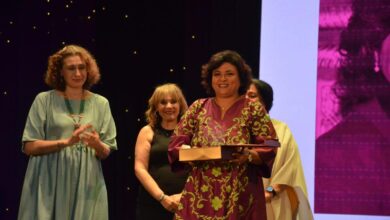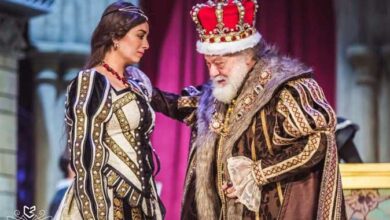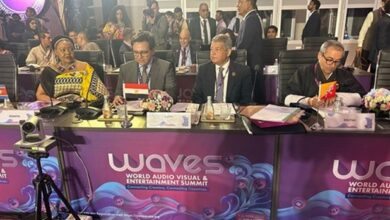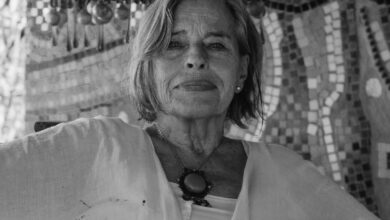Since 2004, Sudanese playwright, director, and actor, Ali Mahdi, and his al-Bugaa theatre troupe, have been travelling from one Sudanese conflict zone to the next engaging child soldiers and war victims in developing plays inspired by Sudan’s rich cultural heritage. The “Theatre between Frontiers” performances use a range of storytelling techniques, folk dance and pantomime in an attempt to promote peace and unity among Sudanese factions. For pioneering this project, al-Bugaa was awarded the Main Prize Friday evening during Freedom To Create annual awards ceremony at the Saladdin Citadel in Cairo.
Freedom to Create, which began in 2006, seeks to foster artistic projects that advocate social justice and inspire the human spirit. Since 2008, it has presented three awards each year, the Main Prize, the Youth Prize and the Imprisoned Artist Prize, to artists across the globe. This year, more than 1,700 artists, six of whom hailed from Egypt, submitted work from over 100 countries. In addition to last night’s awards ceremony, Freedom to Create has organized an ongoing international art exhibition at the Cairo Opera House and film screenings at Downtown’s Rawabet Theatre.
When announcing Main Prize winner, Freedom to Create spokesperson, Priti Devi, praised the work of al-Bugaa theatre troupe as “an inspiring example of the transformational power of the arts to break down oppression and affect real change,” one of the Freedom to Create’s main goals.
In an interview with Al-Masry Al-Youm, Mahdi described the “Theatre between Frontiers” as therapeutic for its members by rehabilitating them to civil life through the power of the creative arts. Mahdi sees Sudanese audiences coming together to enjoy – and even participate – in performances, despite their diverse political and religious ideologies. “We have tools for engaging people. We do not have machine guns, but rather ways of meaningful communication with our fellow citizens,” adds Mahdi. The performances play on common Sudanese familiarity with popular stories. Al-Bugaa chose to donate the prize money of US$50,000 to UNESCO for its construction of a health clinic in Darfur and support of cultural activities in Sudan.
A Congolese Musical theatre troupe named K-Mu was Main Prize runner-up . For several years, the group has worked to raise awareness about the persecution of children accused of sorcery in the Democratic Republic of Congo. Superstition and misguided religious teaching have resulted in the expulsion of hundreds of children from their homes. In some cases, families even murder their own children. Many K-Mu members themselves have experienced persecution resulting from witchcraft allegations.
Owen Maseko, an artist from Zimbabwe, was the second runner-up. His Bulawayo National Gallery exhibition, entitled Gukurahundi, used painting, graffiti and 3D installations to lay bare mass killings undertaken by the Mugabe regime in Zimbabwe. Local authorities closed the exhibition, and he currently faces allegations of undermining President Mugabe’s authority.
The United ACT theatre troupe in Myanmar received The Freedom To Create Youth Prize, an award of US$25,000 to socially engaged artists under the age of 18. Performing at refugee camps, young refugees employ scripts inspired by real life stories of abused children who were trafficked through the Thai-Myanmar border. Aung Myo, Director of the Human Rights Education Institute Of Burma, received the award on behalf of United ACT and expressed hope that the award would raise international awareness.
The Imprisoned Artist Prize, which focuses on risks to personal safety that artists undergo, was awarded to Aron Atabek, an author and poet from Kazakhstan. Atabek openly criticizes the current Kazakhstan regime in his work and remains imprisoned since 2007 on allegations – a charge that he denies – of instigating mass riots in protest against the demolition of shanty towns. Those riots lead to the death of one police officer, and Atabek currently serves an 18 year prison sentence. Atabek received the award for “Nazarbayev’s Regime and Revolution,” which he produced and distributed from inside the prison. Atabek’s son, Askar Aidarkhan, accepted the award on his father’s behalf and thanked Freedom to Create for helping to publicize his father’s case.
Distinguished jury members that selected this year’s winners included: Jehan Sadat, Egypt’s former First Lady; Mariane Pearl, widow of the murdered New York Times journalist, Daniel Pearl; Dame Sandra Dawson, Professor of Management at Oxford University; Mohsen Makhmalbaf, a prominent Iranian filmmaker; and Tariq Ramadan, Professor of Contemporary Islamic studies at Oxford University.
Egyptian singer Donia Massoud performed the opening act of the ceremony and sung a number of folk songs from Port Said and Upper Egypt. The awards ceremony was followed by ecstatic performances from Eric Sell, a Namibian hip hop artist, Arabian Knightz, an Egyptian hip hop group, and Hakim, a popular Egyptian singer.




